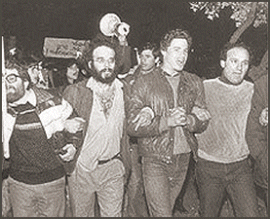|
Selected parts about
Emil Grunzweig and the horrible demonstration
from Tzaly Reshef's book: "Peace Now".
"The sound of the explosion and the strange smell which
penetrated the air paralyzed all for a moment. The first to collect himself
was Abu, who understood that a grenade had exploded in the middle of the
demonstration. The murder threats which accompanied the entire demonstration
had not been empty. Someone had thrown a grenade at us.
 Emil
Grünzweig (rechts) Emil
Grünzweig (rechts)
A grenade. It is hard to describe our shock at the
sound of those words. Of course, we had been aware that the struggle we were
involved in was a serious one and that the fury we were arousing in certain
sectors of the public was very real. We knew well throughout the summer of
1982 the public debate in Israel had reached new levels of violence. Still,
we found it hard to believe, even when we heard the explosion, that someone
wanted to murder us. It seemed like a nightmare, but the sound of ambulance
sirens screeching their way toward us, were horribly real. Yehushua Shkedi
and Adi Levi were seriously injured, Avrum Burg, Ze'ev Shavit and Yo'av
Assia suffered less serious injuries and were taken to Sha'arei Zedek
Hospital. It was only several hours later that we learned that the
casualties had included one dead. Emil Grunzweig.
In retrospect, I think we must have all been on automatic pilot that night.
None of us stopped for a moment to absorb the significance of what had
happened. I remember being interviewed on TV, saying something about the
gravity of the event happened. We turned my office, which was close to the
government buildings, into a makeshift Headquarter. As soon as news came of
Emil's death we went into action - out of a habit that had become second
nature. We spoke to his family, press, and began making arrangements for the
funeral the following day. Thus, through ritual activity we could postpone
the confrontation with the terrible meaning of what had happened that night.
I myself had not been very close to Emil, but he had been a close friend of
Janet, Yaron Ezrachi, Avishai Margalit and other activists who, had worked
together in the Van Leer Institute.
Emil came from a family of holocaust survivors from
Czechoslovakia and had been a member of Kibbutz Revivim in the Negev, where
he was also a teacher. He was a student of philosophy and political science
and the doctoral thesis he was working on at the time of his murder,
concerned the right to demonstrate.
Emil had been a vehement opposer of the war from the very beginning.
Nonetheless, when he was called to military service with his paratroop
division in Lebanon, he went. Unlike other reserve soldiers, who had been
driven by the war to political activity, Emil came home despondent. On the
morning of the demonstration, he still felt that it was pointless. "It's not
going to make any difference," he said to Janet in a conversation they had
beside the coffee maker in the Van Leer kitchen. Janet persuaded him to take
part any way. Even after the tragedy, she said she felt no remorse at having
persuaded him. "Believe me," she said, "he would have come of his own
accord. "Even if he didn't make it to the starting point, he would certainly
have joined us somewhere along the route, just as many others did that
afternoon after hearing on the radio about the violence we were
experiencing. Friends simply laid aside what they were doing and joined us
in the protest."
Above and beyond the shock and the pain, I felt shear fury. Emil had been a
victim of wild incitement on the part of the right, which throughout the
public debate on the war and its implications, had avoided direct encounter
with us over the issues we were raising, choosing instead to delegitimize
us."
 Der
gewählte Krieg: Der
gewählte Krieg:
Sch'lom
haGalil
In den Monaten, bevor Scharon den
Libanon-Krieg 1982 ausrief, war nicht ein einziger Israeli an der Grenze zum
Libanon getötet wurden; mit Beginn des Krieges mussten sich die Israelis an
das tägliche Ablesen einer langen Liste von Gefallenen gewöhnen. Ihje
Sikhram barukh!
Es ist schon zwanzig Jahre her:
Wir haben Emil Grünzweig nicht vergessen!
Bei einer Demonstration in Jerusalem fordert die Friedensbewegung im
Februar 1983 den Rücktritt Scharons. Es kommt zu gewalttätigen
Auseinandersetzungen mit Anhängern Scharons. Die Demonstranten werden als
Verräter und Feinde Israels beschimpft und mit Gegenständen beworfen. In
Jerusalem wird Emil Gruenzweig durch eine Handgranate getoetet...
Erinnerungen an den 8.Februar 1983:
Ein Meer von Hass
Mit Spannung erwarteten wir, genauso wie das ganze
Land, die Veröffentlichungen der Untersuchungsergebnisse der
Kahan-Kommission...
hagalil.com 06-02-2003 |